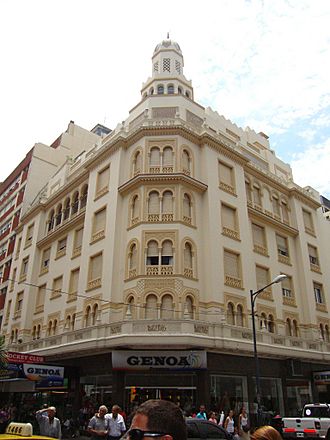Palacio Arabe facts for kids
Quick facts for kids Arab palace |
|
|---|---|
|
Palacio Árabe
|
|

Palacio Árabe view from San Martín street (2010)
|
|
| General information | |
| Type | Residential |
| Location | Córdoba 1681 Mar del Plata Argentina |
| Coordinates | 37°59′57″S 57°32′49″W / 37.99917°S 57.54694°W |
| Construction started | 1945 |
| Completed | 1949 |
| Design and construction | |
| Architect | Valentín Brodsky |
| Main contractor | Julián Galli |
The Palacio Árabe (meaning "Arab Palace" in English) is a special building in downtown Mar del Plata, Argentina. It was designed in a style called Neo-Mudéjar. This style mixes traditional Spanish architecture with influences from Islamic art.
The Story of the Arab Palace
The Arab Palace was built by a Syrian immigrant named Jalil Mahmud Hassein. He was also known by his Spanish name, Julián Galli. During a trip to the Iberian peninsula (which includes Spain and Portugal), he was amazed by the beautiful Moorish architecture. This style was brought to Spain by the Moors, who were Muslim people from North Africa.
Julián Galli then dreamed of building a six-story apartment building in Mar del Plata. He wanted it to look like the amazing buildings he had seen. These buildings had the special features of the Mudéjar style.
He hired an architect named Valentín Brodsky to design the project. The construction started in 1945. Florencio Marco was in charge of overseeing the building work.
What Makes the Arab Palace Special
The apartment building was finished in 1949. It ended up having five stories instead of the six that Galli first planned. This was because of rules from the local government at that time.
The Palacio Árabe combines many different Moorish and Islamic decorations. You can see typical arcades, which are rows of arches. There is also filigree decoration, which means very delicate, lacy patterns. The building also features colorful polychrome tiles. These are tiles with many different colors.
The top of the building has a small tower called a minaret. This minaret is on the corner of the building. Minarets are often found on mosques, which are Islamic places of worship.
In 1995, the Lebanese community placed a special plaque in the building's hall. This plaque was dedicated to Julián Galli, honoring his vision.
See also
 In Spanish: Palacio Árabe (Mar del Plata) para niños
In Spanish: Palacio Árabe (Mar del Plata) para niños

